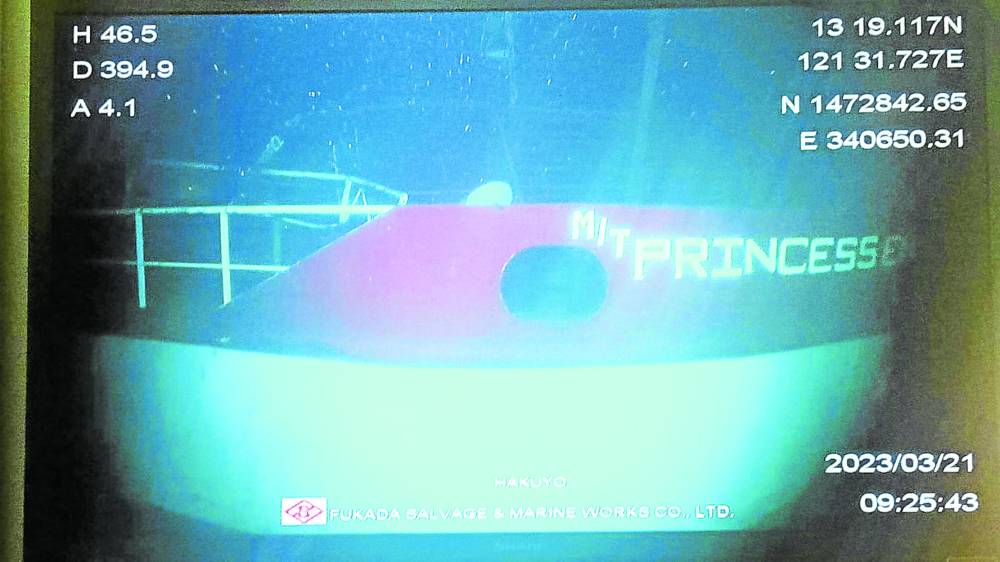Marina orders MT Princess Empress owner: Stop operations

LOST AND FOUND | A Japanese remotely operated underwater vehicle on Tuesday located the oil tanker MT Princess Empress at a depth of 394.9 meters in the waters between Oriental Mindoro and Marinduque. The ship continues to leak oil almost a month after it sank on February 28, 2023. (Photo from the Philippine Coast Guard)
The Maritime Industry Authority (Marina) has issued cease-and-desist orders (CDO) against the owner of MT Princess Empress, the oil tanker that sank and caused a massive oil spill that wreaked havoc on the fishing villages and the marine ecosystem in Oriental Mindoro.
According to Marina Administrator Hernani Fabia, the agency issued two CDOs last week on RDC Reield Marine Services.
“One is for purposes of cancellation of the franchise or the certificate of public convenience, while the other one is [for the company] to cease and desist operations,” Fabia told reporters on the sidelines of the Oil Spill Inter-Agency Committee meeting held at the Department of Justice on Thursday.
READ: Mindoro oil spill victims with ample proof can seek compensation, says lawyer
He added that the orders would remain in effect pending the result of the investigation of the oil spill.
Article continues after this advertisementJustice Secretary Jesus Crispin Remulla earlier said that MT Princess Empress was a “rebuilt scrap” that was not intended to transport oil “from the very beginning.”
Article continues after this advertisementBut according to Fabia, the sunken tanker was a newly constructed vessel built “from scratch.”
“Based on our records, this is a new construction. We have conducted an investigation and we will submit that to the NBI (National Bureau of Investigation),” he added.
Favorable weather
Meanwhile, marine scientists from the University of the Philippines said on Thursday that weaker winds and calmer seas have opened up a “window of opportunity” to collect the massive oil spill off the coast of Oriental Mindoro province.
In an interview with the Inquirer, Dr. Irene Rodriguez of the UP Marine Science Institute said the changes in the prevailing winds—such as the weakening of the northeast monsoon or “amihan,” and the shift to easterly winds—“favor calmer waters and prevent the further spread of oil in the area.”
READ: Low-level contaminants found in fish in oil spill areas
These conditions, she noted, concentrated the spill into one area, forming a 37.8-square-kilometer slick—larger than Las Piñas—very near the suspected location of the sunken MT Princess Empress that caused the spill last Feb. 28.
Rodriguez urged the government to ramp up cleanup efforts while the wind conditions “favor easier deployment of vessels, skims and booms for the retrieval of oil while it is still offshore.”
Among others, she recommended the use of industrial booms and isolated burning of the oil to contain the slick.
Verde Island threat
For oil that has reached the shores, she urged local people to deploy “indigenous” cleanup solutions, such as do-it-yourself booms made of coconut husks, in coordination with the Philippine Coast Guard.
Delayed action, she warned, could see the slick travel further into the Verde Island Passage, a strait that traverses Batangas and Mindoro often considered the “center of the center” of global biodiversity.
READ: Oil spill reaches Verde Island Passage
The oil slick is threatening thousands of endangered and threatened species in the passage, which is known to have the world’s highest concentration of coastal fishes, corals, crustaceans, mollusks, seagrasses and mangroves.
Rodriguez said they based these estimates on recent satellite images and weather reports from the government’s Philippine Atmospheric, Geophysical and Astronomical Services Administration, as well as from the National Oceanic and Atmospheric Administration, Satellite and Information Service.
Slow response
MT Princess Empress was carrying 800,000 liters of industrial fuel when it sank in the waters off Naujan, Oriental Mindoro, due to engine trouble. The vessel was located by a remotely operated vehicle off Pola town on Tuesday.
The accident led to an oil spill, where slick reached the coastlines of Oriental Mindoro, Palawan, and Antique, moving further north toward Batangas.
READ: Oriental Mindoro oil spill now reaches Palawan shores
The Department of Social Welfare and Development reported that as of Tuesday, 31,469 families (148,382 people) from 119 barangays in Oriental Mindoro, eight in Palawan, and four in Antique were affected by the oil spill.
A group of 91 lawyers had earlier criticized the supposed “lackluster response” of the government in addressing the oil spill.
They decried the lack of permits of the shipowner, and the lack of clear coordination among the government agencies supposed to be responding to the disaster.